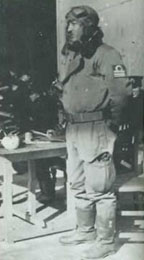planned 'Operation Weserübung', the invasion of Denmark and Norway in 1940; after the invasion became Commander of the German troops in Norway between 1940 and 1944; joined the army in 1907 and during World War I was given various regimental and staff appointments; a member of the Freikorps in 1919, was transferred to the Reichswehr, and between 1925 and 1927 served in the Operations Division of the War Ministry; was promoted to Brigadier on October 1, 1932 and was then military attaché in the German embassies in Prague, Belgrade and Bucharest between 1933 and 1935; on July 1, 1935 was promoted to Major General and Chief of Staff of the Third Army and in 1937 to Lieutenant General; in 1939 commanded the Twenty First Army Corps during the Invasion of Poland, and was promoted to General of Infantry; was dismissed from his command on December 18, 1944 for opposing the policies of Josef Terboven, the Reich Commissioner for Norway; after the war, was tried by a joint British-Norwegian military tribunal for violating the rules of war; had passed on the Führerbefehl known as the Commando Order which required captured saboteurs to be shot (several were), and was therefore convicted and sentenced to death in 1946; sentence was later commuted to twenty years' imprisonment; was released on July 23, 1953 due to bad health.
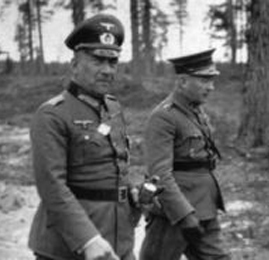
American commander of Task Force 11, based on the carrier Lexington, which fought at the battle of the Coral Sea; although the Lexington was sunk during the action, lacking sufficient fighters to protect it, went on to tak overall command of land-based aircraft in the South Pacific; During 1943 and 1944, though he attracted little attention, contributed significantly to the success and the paoce of the American offensives, notably in the Solomons, by employing new offensive strategies for bombardment, invasion and the quick exploitation of captured airfields for further offensives.
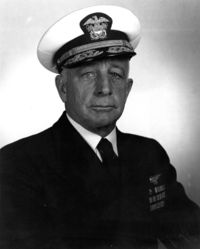
winner of a Medal of Honor during World War I, commanded carrier-based naval forces in the Pacific during World War II; chosen to lead the operation ot relieve Wake Island after the attack on Pearl Harbor, his most distinguished service was given during the crucial naval battles of the summer of 1942, most notably at the Battle of the Coral Sea and at Midway; the interception by Fletcher's Task Force 17 of the Japanse invasion force headed for Port Moresby, which resulted in a 4-day air battle (May 4-8), contributed significantly to the crucial Allied tactical victory achieved in the Coral Sea, though the carrier Lexington was lost and his flagship Yorktown was damaged; after the Midway battle was appointed Vice Admiral in command of the expeditionary force to protect operations at Guadalcanal, fighting at the battle of Savo Island and finally at the battle of the Eastern Solomons, where his ship, the Saratoga was damaged, and he himself wounded; returned to Washington for temporary duty and retired in 1947.
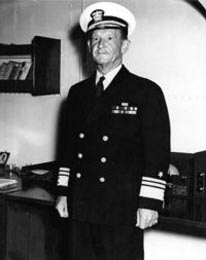
a former World War I naval aviator and banker; an intense, retiring man, was a driving force as undersecretary of the US Navy in providing the navy with ships, aircraft and ordnance during World War II; succeeded Frank Knox as navy secretary in 1944; spent much time in the war theaters; later became the first US defense secretary from 1947 to 1949; was force to resign by Truman who was unhappy with his performance; committed suicide the same year.
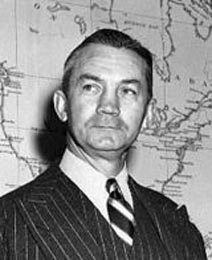
promoted to general in the Spanish army in Morocco in 1916; became deputy commander of the Spanish Legin and army chief of staff; returned from duty in the Canary Islands in July 1936 to capture Medilla, touching off the bloody three-year Spanish Civil War; emerged as the country's absolute dictator; during World War II trod a path of nonbelligerence, if not strict neutrality; skillfully brushed off Hitler's designs on the British bastion at Gibraltar; grew cooler to the Axis powers, though he did send Spanish volunteers, the Blue Division, to fight with the Germans on the Russian front.
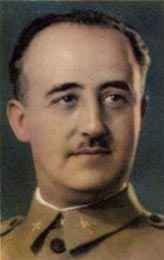
German Governor-General of occupied Poland; saw service in the post-World War I Freikorps and was an early member of the Nazi Party becoming its legal adviser in 1929; was responsible for the drafting of the Gieichschaltung legal system and founded and became President of the German Academy of Law; proclaimed that 'love of the Führer has become a concept in law'; following the defeat of Poland and the seizure of territory by Germany and the Soviet Union, was appointed Governor-General; operated a brutal and punitive regime of enslavement and extermination which ended when he fled to Germany before the Russian advance in 1944; arrested by the Allies after the war; compiled an extensive diary of his work which is a source of much early Nazi history; was tried as one of the major war criminals at Nuremberg, pleaded guilty to the charges against him and was hanged in October 1946.

commander in chief of the Royal Navy Home Fleet; directed the pursuit and destruction of the German battle cruiser Scharnhorst in December 1943; led the Eastern Fleet in the Indian Ocean; took over the British Pacific Fleet in 1944.
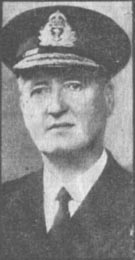
colorful British Army officer, raised in New Zealand, who commanded New Zealang ground forces throughout World War II; after a famous career in the first war, during which he was wounded many times and received the Victoria Cross (highest British award for gallantry), retired a popular hero in 1937; in 1939 returned to the British Army as a major-general and took command of the New Zealand division, which he trained for Imperial service; although New Zealand forces had expected to fight in Europe, the rapid defeat of France in 1940 meant that his troops first saw action in the campaign for Egypt as part of Wavell's Desert Army; later led his forces in Greece, Crete, the Desert War, Tunisia, Sicily and Italy; has been criticized for his defense of Crete, where as garrison commander in May 1941 dispersed his forces to meet an anticipated seaborne attack, and later for his strong advocacy of the bombing attack on the monastery at Cassino; taken as a whole, however, his World War II career was a success, and the New Zealand division was one of the most respected units of the British 8th Army; was Governor General of New Zealand from 1946-52.
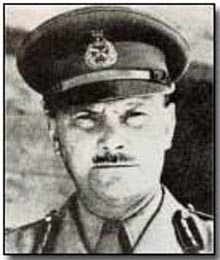
veteran pilot of Japan's war with China, commanded the air strike against Pearl Harbor in December 1941 and was later involved in the planning for the Battle of Midway; unable to pilot his plane during the Midway battle due to illness, was wounded on the deck of his flagship Akagi, when it was attacked by dive-bomber squadrons from the US carriers Yorktown and Enterprise; in 1943-4 served as a senior staff officer to Adm Koga, newly appointed commander of the Combined Fleet; afterh the war, was converted to Christianity and travelled regularly to the United States and Canada to visit Japanese immigrants there; became a US citizen in 1966.
